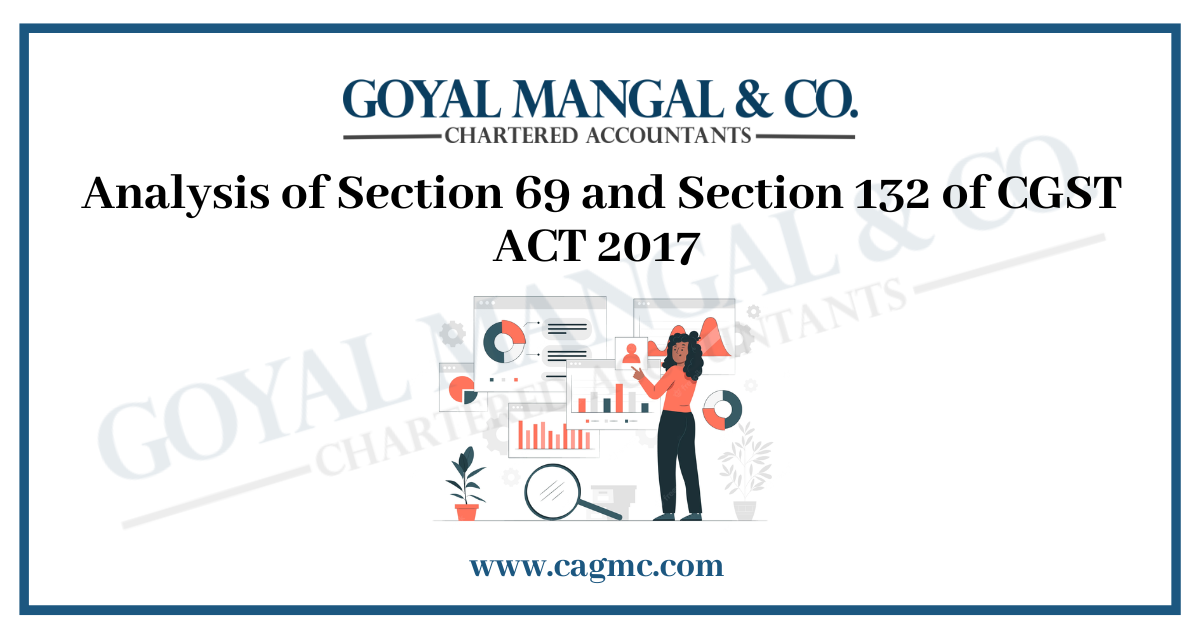
Arrest provisions were added to the GST regime to address specific situations brought to the attention of tax evaders when a person is involved in specific arrestable offences and the amount of tax involved in such offence exceeds a specified limit. Arrest provisions may appear very strict, but they are necessary for effective tax administration and also act as a deterrent and instil a sense of discipline.
|
Table of content |
What is section 69 of CGST Act 2017
This section deals with the power of arrest when a person commits any of the following offences which are punishable under clause (i) or (ii) of sub-section (1) or under sub-section (2) of section 132 of the CGST Act. The Commissioner is empowered to authorise by warrant any officer to arrest a person if there is reason to believe that such a person has committed the said offences.
Analysis of section 69 of CGST Act 2017
Section 69 of the CGST Act deals with the following powers:
- If the commissioner has sufficient reason to believe that a person has committed a criminal offence pursuant to section 132 (1) (a) to (d) of the CGST Act, he may, by warrant, authorise the arrest of such person.
- The officer authorised to arrest must then inform the person of the reasons for the arrest and present them to the Magistrates’ Court within 24 hours.
- The person is then admitted to bail or custody by a judge.
- In the event of a non-cognizable and bailable offence, the Deputy/Assistant Commissioner can release the bailee as he has the same powers as the Head of Police Station.
And when such crimes (as described above) are punishable under section 132 (i) and ii) or section 132(2) as follows:
In cases where the amount of reduced tax or the amount of the input tax credit has been incorrectly used or utilized, or the amount of the refund has been incorrectly collected:
- More than Rs. 500 Lakhs: Punishment with imprisonment for a term of up to five years and a fine under section 132(1)(i); or if the amount exceeds Rs.250 lakh but does not exceed Rs.500 lakh: Punishment with imprisonment for a term which may extend to 3 years and with a fine under section 132(1)(ii)
- Section 132(2): Second and every subsequent conviction for any of the crimes listed in 132—imprisonment for up to 5 years and a fine.
- If the offence involves an amount exceeding Rs. 500 lakh and such as can be punished for a period that can be extended up to 5 years and a fine according to section 132 (i), then such a criminal offence will be cognizable and cannot be imposed according to section 132 (5). The police officer who arrests such a person is obliged to inform him of the reasons
- Arrest and bring him to court within 24 hours. All other offences under the GST Act will be non-cognizable and will be chargeable under Article 132(4). In the case of such offences, in accordance with the provisions of the Penal Code 1973, the arrested person will be admitted to bail or, in default of bail, will be remanded to the custody of the magistrate. The Assistant/Deputy Commissioner can grant bail and is vested with the powers of the Head of Police Station.
What is section 132 of CGST Act 2017
This section deals with cases of tax evasion and criminal proceedings relating to specific events subject to the amount of tax to be deducted. This provision regulates the criminal prosecution of offenders and the punishment that is initiated against them. In the normal course, prosecution is the initiation or initiation of criminal proceedings; the process of formally charging an offender before a judicial tribunal and prosecuting him to final judgement on behalf of the state or government; or by indictment or information. This section deals with cases of tax evasion and criminal proceedings relating to specific events subject to the amount of tax to be deducted. This provision regulates the criminal prosecution of offenders and the punishment that is initiated against them. In the normal course, prosecution is the initiation or initiation of criminal proceedings; the process of formally charging an offender before a judicial tribunal and prosecuting him to final judgement on behalf of the state or government; or by indictment or information.
Analysis of section 132 of CGST Act 2017
In this section, the legislators have identified situations in which leakage of government revenue may occur and therefore have listed 12 such bad faith situations, which are as follows:
- The supply of goods or services, or both, without an invoice envelope in order to avoid paying taxes;
- Where a person issues an invoice or bill without actually supplying goods or services, or both, resulting in an unauthorised credit or refund of tax;
- Any person claiming an input tax credit using the invoice referenced in (b) above;
- TAX collection without payment to the government for more than three months after the due date;
- Tax evasion, credit use, or obtaining a refund with the intent to defraud, unless included in (a) through (d) above;
- Falsifying financial records or submitting false records/accounts/documents/information in order to avoid paying taxes.
- Obstructs or attempts to obstruct any officer in carrying out his or her duties under this Act;
- Acquires, transports, or otherwise disposes of any goods that he knows or has reason to believe are subject to confiscation under this Act or its implementing rules;
- Accepts or deals in any way with any offer of services that it knows or has reason to believe violates any of the provisions of this Act;
- Tampers with or destroys physical evidence or documents
- Fails to provide any information required under this Act or provides false information;
- Attempting or assisting in the commission of any of the aforementioned crimes
Case laws and judgements related to section 69 and 132 of CGST Act 2017
Different High Courts have taken conflicting views on this issue. The Telangana High Court in the case of P.V. Ramana Reddy v. Union of India upheld the Commissioner’s power to order arrest where a cognizable and non-bailable offence has been committed. The court said there was no need to file a first information report and denied the taxpayer bail before arrest. While the Bombay High Court in Sapna Jain v. Union of India said that no coercive action should be taken against taxpayers and no arrests should be made.
Recently, the Bombay High Court in the case of Yogesh Jagdish Kanodia v. State of Maharashtra dealt with the issue of arrest of an individual and whether it is proper under Sections 132 and 69 of the CGST Act. The petitioner in the case was arrested and brought to the next main metropolitan municipality for committing a crime pursuant to section 132(1) (b)(c) of CGST Act and that since the input tax credit wrongly availed by the petitioner exceeded INR 500 lakh and the offense was punishable with imprisonment for a term, it was a cognizable and non-bailable offense under sub-section (5) of the same section. The High Court held that such offenses had been committed justifying the arrest and rejected the petitioner’s bail application.
Similarly, the Delhi High Court recently upheld the arrest provision in the CGST Act for tax evasion. The court in this case emphasized that when any person is arrested under the CGST Act, that person must be informed of the reasons for the arrest and must be produced before a magistrate within 24 hours. This ensures judicial review of the acts of the executive and cannot be termed unreasonable or unreasonable.
Conclusion
From the combined interpretation of the above provisions with Section 69 of the CGST Act, it can be concluded that the power of arrest can be exercised only if the Commissioner has reason to believe, on the basis of concrete or credible evidence or documents, that the person has committed the said offence, but Section 132 of the CGST Act does not use the term “reason to believe” and says who commits or causes the commission of specified offences and benefits from them.


